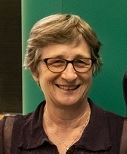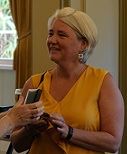Marsden Medal 2020
 Professor Martha Savage (Victoria University of Wellington) has been awarded the 2020 Marsden Medal for her pathbreaking research in the fields of seismology, plate tectonics and volcanology, as well as her distinguished record of service to New Zealand and the global scientific community. In her pioneering work, Prof Savage used remotely sensed texture—seismic anisotropy—of rocks deep below Earth’s surface to fundamentally change how plate-boundary processes are studied and understood. The observations at the heart of her work, separation of seismic waves into components that travel at slightly different speeds, are due to rock textures and once detected, those textures reveal how tectonic plates move and respond to stresses built up within them. She has conducted comparative studies of deep crustal properties and processes in New Zealand and the western United States, investigated the relationship between time-varying anisotropy and volcanic eruption sequences, and developed new observational approaches and new computational methods to interpret seismic data. Her work showcases New Zealand as a rich natural laboratory in which to develop globally relevant geophysical methods and process understanding. Prof Savage was also a pathbreaker as the second woman to winter-over in Antarctica. Her Antarctic work was focused on cosmic-ray observations at Amundsen-Scott South Pole Station, but she credits it to have also allowed her to learn about the importance of personal character and positive, supportive relationships in science. Professor Savage has a distinguished record of service, to New Zealand and the global scientific community, through review panels, advisory boards, editorial boards and mentorship. She is a Fellow of the Royal Society of New Zealand and is the first New Zealand woman to have been elected Fellow of the American Geophysical Union.
Professor Martha Savage (Victoria University of Wellington) has been awarded the 2020 Marsden Medal for her pathbreaking research in the fields of seismology, plate tectonics and volcanology, as well as her distinguished record of service to New Zealand and the global scientific community. In her pioneering work, Prof Savage used remotely sensed texture—seismic anisotropy—of rocks deep below Earth’s surface to fundamentally change how plate-boundary processes are studied and understood. The observations at the heart of her work, separation of seismic waves into components that travel at slightly different speeds, are due to rock textures and once detected, those textures reveal how tectonic plates move and respond to stresses built up within them. She has conducted comparative studies of deep crustal properties and processes in New Zealand and the western United States, investigated the relationship between time-varying anisotropy and volcanic eruption sequences, and developed new observational approaches and new computational methods to interpret seismic data. Her work showcases New Zealand as a rich natural laboratory in which to develop globally relevant geophysical methods and process understanding. Prof Savage was also a pathbreaker as the second woman to winter-over in Antarctica. Her Antarctic work was focused on cosmic-ray observations at Amundsen-Scott South Pole Station, but she credits it to have also allowed her to learn about the importance of personal character and positive, supportive relationships in science. Professor Savage has a distinguished record of service, to New Zealand and the global scientific community, through review panels, advisory boards, editorial boards and mentorship. She is a Fellow of the Royal Society of New Zealand and is the first New Zealand woman to have been elected Fellow of the American Geophysical Union.
Hill Tinsley Medal 2020

Cranwell Medal 2020
 Dr Dianne Sika-Paotonu is the Scientific Lead for New Zealand’s Rheumatic Fever and Penicillin Research Programme and the Associate Dean (Pacific) at the University of Otago, Wellington. Since completing her PhD at the Malagan Institute in 2015, Dr Sika-Paotonu has maintained a strong record of public engagement with community groups and with students, at secondary, tertiary undergraduate and postgraduate levels. She regularly presents science to non-scientific audiences and has received local and international recognition for her research and science communication efforts. Her awards include the MacDiarmid New Zealand Young Scientist of the Year (Advancing Human Health & Wellbeing category), Colmar Brunton Research Excellence award, and the Australasian Society of Immunology BD Science Communication award. Dr Sika-Paotonu is of Pacific heritage and is actively involved in mentoring young Pacific people in the Wellington region. She also holds numerous service and leadership responsibilities within the Pacific community, and is an HRC Pacific Emerging Research Fellow, as well as a recent recipient of the Sir Thomas Davis Te Patu Kite Rangi Ariki Health Research Fellowship from HRC. She is also a member of the Royal Society Te Apārangi Council, the National Science Challenge Healthier Lives Science Leadership Team and the HRC New Zealand Pacific Health Research Committee. Dr Sika-Paotonu is a very worthy winner of the 2020 NZAS Cranwell Medal.
Dr Dianne Sika-Paotonu is the Scientific Lead for New Zealand’s Rheumatic Fever and Penicillin Research Programme and the Associate Dean (Pacific) at the University of Otago, Wellington. Since completing her PhD at the Malagan Institute in 2015, Dr Sika-Paotonu has maintained a strong record of public engagement with community groups and with students, at secondary, tertiary undergraduate and postgraduate levels. She regularly presents science to non-scientific audiences and has received local and international recognition for her research and science communication efforts. Her awards include the MacDiarmid New Zealand Young Scientist of the Year (Advancing Human Health & Wellbeing category), Colmar Brunton Research Excellence award, and the Australasian Society of Immunology BD Science Communication award. Dr Sika-Paotonu is of Pacific heritage and is actively involved in mentoring young Pacific people in the Wellington region. She also holds numerous service and leadership responsibilities within the Pacific community, and is an HRC Pacific Emerging Research Fellow, as well as a recent recipient of the Sir Thomas Davis Te Patu Kite Rangi Ariki Health Research Fellowship from HRC. She is also a member of the Royal Society Te Apārangi Council, the National Science Challenge Healthier Lives Science Leadership Team and the HRC New Zealand Pacific Health Research Committee. Dr Sika-Paotonu is a very worthy winner of the 2020 NZAS Cranwell Medal.
Shorland Medal 2020

© 2024 NZAS | Disclaimer Sitemap |